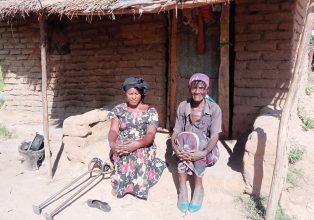Caregivers return to basics to save lives
A battered earth road that splits a vast floodplain west of Chikwawa town takes travellers close to Majete Wildlife Reserve, Malawi’s premier home of the Big Five: Lion, Leopard, Elephant, Rhino and Buffalo.
Opened in 2020, Majete 2 Health Centre provides a lifeline for the hard-to-reach community of over 8100 people.

Women no longer have to endure long walks or to cross crocodile-infested rivers to reach Gola Health Centre, which has no maternity wing.
“Women were dying giving birth at home or on the way to Gaga, the nearest facility which provides maternity services,” says Anne Gabi, a 29-year-old mother of three.
On Monday, April 29 2024, she delivered a bouncing baby girl at Majete 2, where 15 to 20 babies are born weekly.
“I arrived around midnight and the staff on duty welcomed me with smiles and handled me with respect until I gave birth around 4 am,” she stated, gazing at her little bundle of joy.
Gabi was mostly impressed with the cheerful caregivers’ attention to detail when conducting mandatory checkups.
“The team did all they could to help me deliver safely, and remained friendly” she says.
Gabi salutes the staff for frequently checking on her and filling out the checklist even after giving birth.
The Ministry of Health requires caregivers to complete the labour chart to identify the possible risks and ensure no life is lost during childbirth.
However, Majete 2 Health Centre did not tick all the boxes until 2022 when supervisors from Chikwawa District Health Office (DHO) told them: “You can do better”.
Medical assistant-in-charge Emmanuel Mumba remembers the turning point.
“Most labour charts were either incomplete or not filled. No matter how well we assisted our clients, the blanks showed we weren’t monitoring their condition. The visiting supervisors mentored us to fill it correctly and later trained a nurse and me how to mentor our colleagues,” he says.
The two periodically convene their team to share the life-saving lessons in an in-house Quality Improvement (QI) project.
Says Mumba: “We remind each other and share tasks to make the systems work. One checks whether the forms are available or it’s time to order more while another ensures every case is properly documented.”
QI is part of the United Nations Joint Programme for Health Systems Strengthening, also known as Umoyo Wathu. The six-year project—now in its fifth year—is jointly implemented by Unicef, UNFPA and the World Health Organisation with funding from the UK’s Foreign Commonwealth and Development Office.
“Majete 2 has completed a QI project that has contributed to reductions of maternal mortality in Chikwawa to 98 deaths per 100 000 live births, which is below the national average,” explained Catherine Tembo, the QI focal person at Chikwawa DHO.
The nurse says quality services motivate women to deliver at the hands of skilled caregivers in a clinical setting.
“With peer mentorship and improved outcomes, we are reducing preventable deaths and complications from home deliveries that were common in the area,” she states.
According to nurse Akim Silora, the tracker eliminates delays in identifying life-threatening conditions and putting patients in an ambulance to Chikwawa District Hospital.
Says Silora: “Teamwork, accountability and attention to detail are essential for monitoring the condition of both the mother and the child from the time she arrives to the day they are discharged.
“The labour chart spells out the indicators, making it easy for service providers to predict outcomes and make decisions.”





!!!! Hot girls are waiting for you on —– https://u.to/sYM6IA
ZlSgPaisQt
Your writing has a way of resonating with me on a deep level. I appreciate the honesty and authenticity you bring to every post. Thank you for sharing your journey with us.
Диплом о среднем специальном образовании: где и как купить диплом купить сад